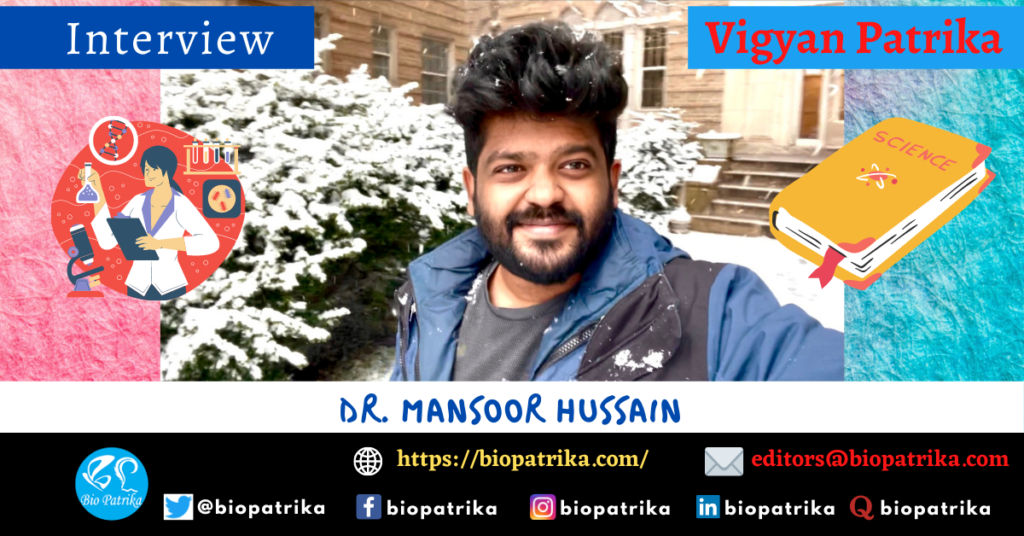Dr. Mansoor Hussain’s interview with Bio Patrika hosting “Vigyan Patrika”, a series of author interviews. Dr. Hussain did Masters in Biotechnology from Bharathidasan University, Trichy. After that, he did his PhD with Dr. Sagar Sengupta at National Institute of Immunology (degree awarded by Bharathidasan University). Currently, he is working as a post-doctoral fellow in Dr. Vilhelm Bohr’s laboratory of Molecular Gerontology at National Institute of Health (NIH), Baltimore, USA. His research is focused on the role of DNA repair proteins in Alzheimer’s disease progression. Here, Mansoor talks about his work on “MITOL-dependent ubiquitylation negatively regulates the entry of PolγA into mitochondria” published as the first author in PLOS Biology.
How would you explain your paper’s key results to the non-scientific community?
Mitochondria has its genome and it codes for 13 essential protein subunits of the respiratory chain complex. Pathogenic mtDNA mutations lead to relative depletion in ATP levels, mitochondrial dysfunction and ultimately cellular death. To prevent the mtDNA mutations, mitochondria have tightly regulated replication and proof-reading mechanism. Mitochondrial polymerase (POLG) which is the sole DNA polymerase involved in mitochondrial DNA replication. POLG is coded in the nuclear genome enters into mitochondria for its replicative function. Mutations in POLG can cause multiple mitochondrial dysfunctions associated with diseases like Alpers Huttenlocher syndrome, ataxia neuropathy spectrum and autosomal dominant progressive external ophthalmoplegia (PEO). Our study has shown a novel mechanism by which mitochondrial targeted POLG undergoes ubiquitylation via Mitol on the outer mitochondrial membrane. This ubiquitylation acts as a deciding factor for POLG to enter or not. Further, we have shown that pathogenic variants of PEO POLG exhibits higher ubiquitylation by Mitol and target them for ubiquitin mediated proteosome degradation (UPS). Hence the mtDNA replication is severely affected in PEO variants. For the first time, we have shown that by manipulating ubiquitylation status, the PEO mutant proteins can be reactivated.

“our research unveiled the role of ubiquitylation in regulating mitochondrial protein entry.”
What are the possible consequences of these findings for your research area?
About 90% of mitochondrial proteins are coded in the nuclear genome, transcribed, translated and then translocated to mitochondria. Earlier, it was believed that mitochondrial targeting signal (MTS) is sufficient for mitochondrial targeted proteins to enter into mitochondria. However, our research unveiled the role of ubiquitylation in regulating mitochondrial protein entry. This work shows that mitochondrial protein entry is not as simple as we thought. It is more complex and needs further study.
What was the exciting moment (eureka moment) during your research?
Every time I get an interesting result, it’s a eureka moment for me. Particularly, I still remember when I had first developed a western blot for in vitro ubiquitylation of POLG using Mitol. That made us believe that there could be a biological significance for this ubiquitylation.
What do you hope to do next?
Here we showed how Mitol regulates POLG entry into mitochondria. The bigger question is whether this phenomenon is specific to only POLG or its happening to other mitochondrial targeted proteins as well. That would be an intriguing study.
Where do you seek scientific inspiration?
I was a curious little boy like Dexter since my school days. My interest in science and curiosity grown bigger when I joined Dr. Sagar Sengupta’s lab for PhD. I am happy that I had the chance. He is always ready to discuss the issues with experiments and helped in troubleshooting. Above all, I have learned perseverance from him. Patience is the key to success. Attending scientific symposiums and listening to lectures of the world’s renowned scientists keep me on the toe.
How do you intend to help Indian science improve?
Indian science is a strong and rapidly growing scientific community in the world. We mustn’t underestimate the necessity of basic scientific research. As a researcher, I will contribute to the growth of Indian science by executing quality research work and extending collaboration to other Indian scientists.
Reference
Hussain M, Mohammed A, Saifi S, Khan A, Kaur E, et al. (2021) MITOL-dependent ubiquitylation negatively regulates the entry of PolγA into mitochondria. PLOS Biology 19(3): e3001139. https://doi.org/10.1371/journal.pbio.3001139
Email: mansoormarrow@gmail.com
Dr. Sagar Sengupta: http://www.nii.res.in/research/sagar-sengupta
